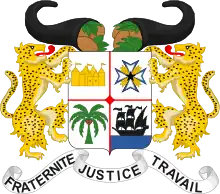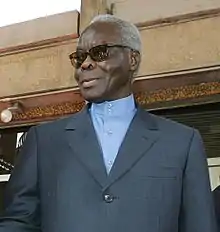| ||||||||||||||||
| ||||||||||||||||
| ||||||||||||||||
 |
|---|
|
|
Presidential elections were held in Benin on 4 March 2001, with a second round run-off on 18 March. They controversially resulted in the re-election of Mathieu Kérékou for a second term. Kérékou's rival Nicéphore Soglo, who had been president from 1991 to 1996, failed in his bid to reclaim the presidency; although he qualified to participate in the second round of the election against Kérékou, he refused to do so, alleging electoral fraud. Adrien Houngbédji, the parliament speaker and third-placed candidate, also refused to participate in a second round. As a result, Kérékou faced fourth-place candidate Bruno Amoussou, who was planning minister and had already given his support to Kérékou, in the second round; Kérékou won an easy victory with 84% of the vote.[1][2]
After the election, it was revealed that the Titan Corporation, a defense contractor based in the United States, had illegally provided $2 million to Kérékou's re-election campaign. The company pleaded guilty and agreed to pay $28.5 million in fines and civil penalties, the largest penalty under the Foreign Corrupt Practices Act up to that point, for bribery and filing false tax returns.[3][4]
Results
| Candidate | Party | First round | Second round | |||
|---|---|---|---|---|---|---|
| Votes | % | Votes | % | |||
| Mathieu Kérékou | Action Front for Renewal and Development | 1,127,100 | 45.42 | 1,282,855 | 83.64 | |
| Nicéphore Soglo | Benin Rebirth Party | 672,927 | 27.12 | |||
| Adrien Houngbédji | Democratic Renewal Party | 313,186 | 12.62 | |||
| Bruno Amoussou | Social Democratic Party | 213,136 | 8.59 | 250,940 | 16.36 | |
| Sacca Lafia | Union for Democracy and National Solidarity | 29,656 | 1.20 | |||
| François-Xavier Loko | Independent | 16,656 | 0.67 | |||
| Soulé Dankoro | Democratic Party | 15,614 | 0.63 | |||
| Adébayo Abimbola | National Rally for Democracy | 15,251 | 0.61 | |||
| Wallis Zoumarou | National Union for Solidarity and Progress | 13,576 | 0.55 | |||
| Rhétice Dagba | Independent | 12,697 | 0.51 | |||
| Marie-Elise Gbèdo | Independent | 8,952 | 0.36 | |||
| Léandre Djagoué | Liberal Democrats' Rally for National Reconstruction – Vivoten | 8,565 | 0.35 | |||
| Lionel Agbo | African Congress of Democrats | 8,226 | 0.33 | |||
| Gatien Houngbédji | Democratic Union for Social and Economic Development | 8,092 | 0.33 | |||
| Olofindji Akandé | Independent | 6,258 | 0.25 | |||
| Sadikou Alao | National Alliance for a Democratic Alternative | 6,223 | 0.25 | |||
| François Kouyami | Independent | 5,414 | 0.22 | |||
| Total | 2,481,529 | 100.00 | 1,533,795 | 100.00 | ||
| Valid votes | 2,481,529 | 93.20 | 1,533,795 | 89.82 | ||
| Invalid/blank votes | 181,066 | 6.80 | 173,809 | 10.18 | ||
| Total votes | 2,662,595 | 100.00 | 1,707,604 | 100.00 | ||
| Registered voters/turnout | 3,034,471 | 87.74 | 3,152,365 | 54.17 | ||
| Source: African Elections Database | ||||||
References
- ↑ "Benin 'day of mourning'" BBC News, 6 April 2001
- ↑ Elections in Benin African Elections Database
- ↑ Fitrakis, Bob (July 18, 2007). "Did U.S. intelligence assets kill Antioch College?". Scoop. Retrieved March 29, 2018.
- ↑ "Business | US company admits Benin bribery". BBC News. 2005-03-02. Retrieved 2014-05-24.

